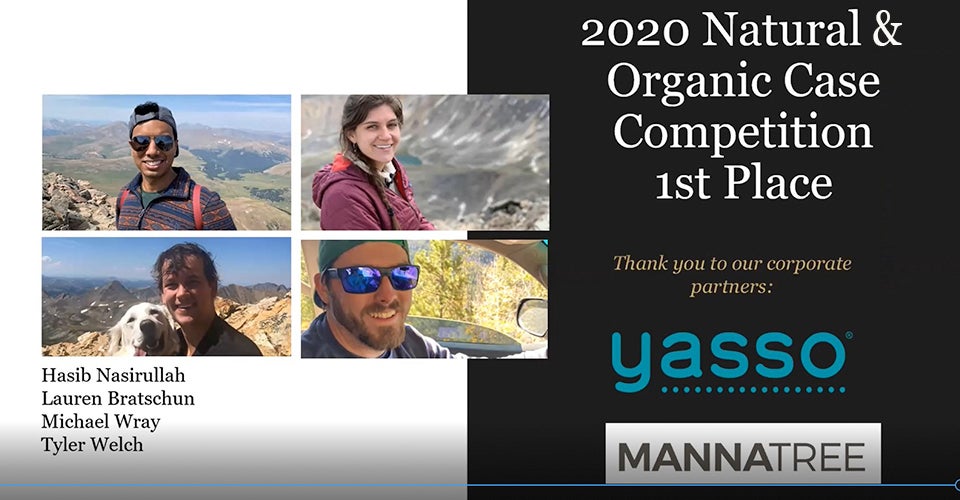Four teams faced off to determine whose solution would win the final round of CESR’s 2020 Natural and Organic Case Competition.

On the day before Halloween, the stage was set for the four finalist teams in Leeds’ first regional Natural and Organic Case Competition, hosted by the Center of Ethics and Social Responsibility (CESR). The tension the audience might normally sense in-person was subdued by the fact that the competition was virtual. Nevertheless, moments before the start, the electricity was apparent in the chatter among those present.
One week prior, finalists were determined in the preliminary round. The participants were from MBA programs at four competing schools: University of Colorado Boulder (Leeds), the University of Denver Daniels Business School, Colorado State University's Impact MBA program, and University of Colorado Denver's Managing for Sustainability program and included 12 teams: one from CSU, two from CU Denver, four from Leeds and five from DU.
The teams were divided randomly into three virtual “rooms,” with four teams competing for the top spot in each room. The top-ranked team in each room automatically advanced to the finals, and the second-place teams in each room were entered into a random drawing to select the fourth team that would move forward.
Because Leeds and the Center for Ethics and Social Responsibility hosted the event, organizers took great care to maintain impartiality, keeping the teams’ schools anonymous from the judges during the competitions.
The 2020 NOCC is made possible by partnerships with Yasso and Manna Tree Partners, who also served as two of the judges in the final round.
The case for Finious Foods
For the preliminary round, teams were charged with developing and proposing a values-aligned growth strategy that incorporated social justice for Finious Foods, a fictional 12-year-old organic chocolate company—now or after the upcoming election and pandemic.
Yet for the final round, the teams had been given a twist on the case. Bimbo Bakeries USA (BBU), a successful food company with more than 20 brands in its portfolio and one that is quickly expanding into organics wants to acquire Finious. But if Finious wants to incorporate social justice into their new growth strategy, they must prove to BBU, and its parent company Grupo Bimbo, that it’s the best financial decision possible.
In other words: Is it possible for a company like Finious to demonstrate integrity and live its values while being smart financially? Or is there no path to maximum ROI that can also benefit, for example, a social good like the social justice movement?
To win the competition, teams would need to think quickly, build on their original solution, accommodate the new information and make the best recommendation to the judges in the final round.
Keeping social justice in the plan
Each team had 14 minutes to present to the four judges: Andy Judd, CMO of Yasso; Christie Zimmerman, product standards manager for Natural Grocers; Paloma Lopez, co-founder and CEO of Future Fit Foods; and Ross Iverson, co-founder and CIO of Manna Tree Partners. After the presentation, the judges had 10 minutes to ask questions and another few minutes to offer feedback to the students.
The winning team from DU took 2020’s social unrest and activism into account and devised a solution that focused on supporting Black farmers. Their idea proposed real impact in the world that is relevant to these turbulent times, winning the judges over when combined with thorough research and solid financial projections.
The team described their main differentiator for Finious is their communities’ stories, showcasing at least one ingredient in each product from a Black farmer and, therefore, directly connecting them to the customers through a story on the packaging. Then, leveraging Bimbo’s relationships and distribution channels, they could grow with a personal, human touch and help support the growth of their own supply chain of Black-owned farms.
Of the winning team, Judd praised the team’s connectivity within their group and their willingness to think outside of the box.
“You took a risk in the case to think about things differently,” said Judd. “All of us [judges] are looking to take a risk in our careers [in socially responsible business] to make a difference.”
1st place, $7,500 – Team 2 (DU): Tyler Welch, Hasib Nasirullah, Lauren Bratschun, and Michael Wray
2nd place, $4,000 – Team 4 (Leeds): Katie Kimmey, Anoud, Max Petersen, and Eric Bohn
3rd place, $2,500 – Team 1 (Leeds): Colleen Johns, Hayden Siekman, Natalie Kra, and Andrew Gendron
4th place, $1,000 – Team 3 (Leeds): Jordin Clough, Tony Gomez, Patrick Noel, and Hazel Shapiro
The Natural and Organic Case Competition is part of Leeds’ MBA Program’s Natural and Organic Pathway, which helps MBA candidates chart a roadmap toward their own career in the industry, leveraging Boulder high concentration of natural and organic companies.





